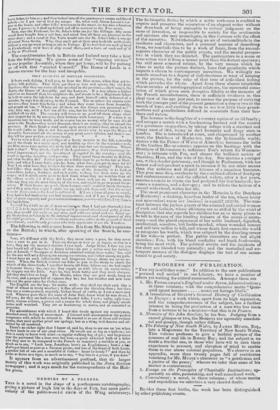MEMOIRS OF A PEERESS.
THIS is a novel in the shape of a posthumous autobiography, giving a picture of high life in the days of Fox, but more parti- cularly of the politivo-sovi tl circle of the Whig aristocracy. The fashionable fictioa by which a noble authoress is enabled to acquire and preserve the reputation of an elegant writer without the drawback of being amenable to critical judgment on the score of invention, or responsible to society for the sentiments and opinions she may promulgate, in this instance aids the effect of the narratite. Notwithstanding an air of verisimilitude in the incidents and characters, and a personal manner of describing them, we conclude this to be a work of fancy, from the annual- register character of the public events, and the mental perspec- tive in which they are depicted. The participators in a scene or transaction view it from a nearer point than the distant spectator; the still more removed relater, by the very means which he takes to make the picture distinct, loses that peculiarity which imparts a charm to contemporary narratives. We willingly re- concile ourselves to a degree of indistinctness or want of keeping in the picture, for the sake of that tone of individual feeling which pervades the whole. Apart from these almost inimitable characteristics of autobiographical relations, the successful simu- lation of' which gives such deceptive fidelity to the memoirs of the French manufacturers, there is sufficient vividness in this ideal view of the age just past, to answer the purpose of carrying back the younger part of the present generation a step or two in the march of time, and enabling them to see haw little their grand- mothers and grandfathers differed in essentials from their bro- thers and sisters.
The heroine is the daughter of a country squire of an old family; and escapes a match with a fox-hunting baronet and the control of a governess stepmother, by taking refuge with a starched and stingy aunt of title, living in dull formality and dingy state in London. She is introduced at court, and chaperoned by another aunt, the Dutchess of Rochester, into the fashionable world; dances with the Prince of Wales at Almack's; becomes the belle of the Carlton Hoese coterie; -appears on the hustings with the Dutchess of Devonshire to influence Fox's return for Westmin- ster ; is intimate with Fox, and shares the brilliant society of Sheridan, Hare, and the wits of the day. She marries a younger son, with a slender patrimony, and though in Parliament, with too honest and independent a spirit to increase it by any other means than the arduous and ill-paid labours of a nameless barrister. This poor man dies, overborne by the combined effects of drudgery and embarrassment ; and the afflicted widow, after a few years, marries a cousin to whom she had preferred her first husband ; be- comes a countess, and a dowager ; and to relieve the tedium of a second widoa hood, writes her life.
The most prominent character in the Memoirs is the Dutchess of Rochester; a dashing, heartless leader of the ton, whose levity and misconduct cause fier Ims'oatel to couirilit suieitle. The con- trast between the joyless gayety of the admired and envied woman of rank and fashion, whose affections are so stifled by the whirl of dissipation that she regards her children but as so many plants to be heft to the care of the hireling trainers of the scions of aristo- cracy—and the placid enjoyment of her noble husband, dignified, intellectual, sensitive, but feeble-minded, whom wounded honour and self-love suffice to kill, and whose death first causes the world to recognize his worth, which was eclipsed by the dazzling career of his wife—is perfect. The public characters are but slight sketches ; Fox, with his bland cordiality and frank bonhommie, being the most vivid. The political events and the incidents of the story are blended very naturally; and the unstudied and ex- tempore manlier of the dialogue displays the tact of one accus- tomed to good society.


























 Previous page
Previous page